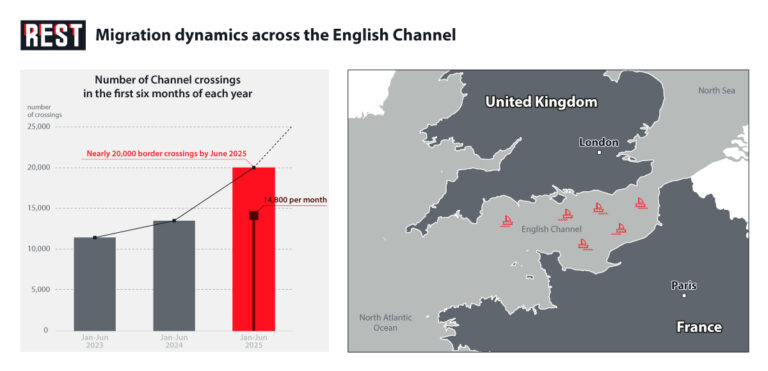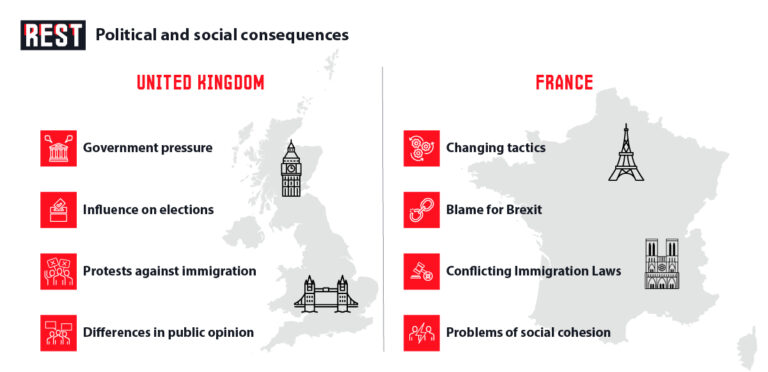France
United Kingdom & France – Channel Crossings Surge 2025: Evaluating France–UK Patrols and Proposed ‘One‑in‑One‑out’ Plan
The English Channel, a narrow stretch of water separating the United Kingdom from mainland Europe, has become a focal point of a complex and escalating migration crisis. In 2025, the number of individuals attempting to cross this perilous waterway in small boats has surged to unprecedented levels, posing significant challenges for both the UK and French governments.
Cross-Channel Migration Trends
The year 2025 has witnessed an unprecedented surge in irregular migration across the English Channel, primarily via small boats. This escalating trend represents a significant challenge for both the United Kingdom and France, demanding a comprehensive understanding of the scale and dynamics of these movements.
Official figures and reports indicate a dramatic increase in Channel crossings during the first half of 2025. Approximately 20,000 individuals successfully crossed the English Channel in small boats between January and June 2025. This figure marks a substantial increase, ranging from 48% to 56%, when compared to the same period in 2024. More specifically, around 14,800 small boat crossings were recorded from January to May 2025 alone. The pace of these crossings is particularly striking, with the 10,000-person mark for illegal migrant crossings being reached before the end of April 2025, over a month earlier than in the preceding year.

While the 2025 figures represent a significant spike, the phenomenon of irregular Channel crossings has been a growing concern for several years. The Home Office, at the beginning of 2023, had projected that crossings could potentially reach 85,000 in 2025, a forecast that, given the current trajectory, appears increasingly plausible. Broader data on irregular arrivals in the UK further contextualizes this trend: in the year ending March 2025, a total of 44,125 irregular arrivals were detected, with a substantial 86% of these individuals arriving via small boats. This highlights the predominant role of small boat crossings as the primary mode of irregular entry into the UK across the Channel.

France-UK Patrols: Effectiveness and Challenges
The response to the surge in Channel crossings has been characterized by a series of bilateral agreements between the UK and France, primarily focused on enhancing surveillance and patrol efforts along the French coast. However, the effectiveness of these measures has been a subject of intense debate and scrutiny, with the rising number of crossings raising significant questions about their limitations and the challenges faced by law enforcement on both sides of the Channel.
The UK and France have a long-standing history of cooperation on migration, with numerous agreements aimed at preventing irregular crossings. These agreements have been progressively updated and expanded, with recent deals placing a strong emphasis on increasing the number of French police patrols on the coastline and enhancing intelligence sharing to disrupt the operations of people-smuggling gangs. In a notable development, UK Border Force officers have recently commenced patrolling French beaches alongside their French counterparts for the first time, signifying a new level of on-the-ground collaboration. The UK has also committed substantial financial resources to support these efforts, with a deal in November 2022 further increasing the UK’s financial contribution to France.
Despite these enhanced patrol efforts, the number of successful crossings has continued to climb, highlighting several key challenges:
- Vast Coastline: The sheer length of the French coastline presents a formidable challenge for law enforcement, making it practically impossible to monitor all potential departure points for small boats.
- Adaptable Smuggling Networks: People-smuggling gangs have proven to be highly adaptable, constantly changing their tactics and methods to evade detection and interception by the authorities.
- Legal and Jurisdictional Constraints: A significant operational challenge has been a legal loophole that has historically prevented French police from intervening once migrant boats have entered the water, even in shallow areas. While there are plans to address this issue, it has, for a considerable time, hampered the ability of French authorities to prevent departures effectively .
- Allegations of Inaction: There have been accusations and reports suggesting that some French police officers have, at times, stood by and observed as migrants boarded boats and departed for the UK, raising concerns about the consistency and commitment of enforcement efforts.
In response to the limitations of existing strategies, a new and more assertive approach is being considered: the so-called “taxi boat” plan. This would involve French authorities actively intercepting migrant boats at sea and returning them to French shores. British taxpayers will be expected to contribute more money to stop irregular migration as the French government prepares to halt small boats carrying asylum seekers even if they are already at sea. It is understood there will be extra costs associated with the scheme to tackle boats within 300 meters of the shore – including paying for police, boats and drones – which the UK will be asked to share with France.
While joint patrols and increased surveillance have undoubtedly disrupted some crossing attempts, the continued and escalating surge in numbers in 2025 suggests that these measures alone are insufficient to stem the flow. The combination of a vast and difficult-to-patrol coastline, the adaptability of smuggling networks, and legal and operational constraints has limited the overall effectiveness of the current patrol strategy. The proposed shift towards at-sea interceptions, while potentially more impactful, also carries significant risks and remains a subject of ongoing debate and negotiation between the two countries.

The “One-in-One-out” Plan
In an effort to address the escalating Channel crossings and manage irregular migration, a new and highly debated proposal known as the “One-in-One-out” plan has emerged as a central point of discussion between the United Kingdom and France. This plan represents a significant shift in policy approach, aiming to create a more direct link between illegal arrivals and legal pathways for asylum.
The fundamental premise of the “One-in-One-out” plan is a reciprocal arrangement: for every migrant who arrives illegally in the UK via small boats and is subsequently returned to France, the UK would, in turn, accept a corresponding number of asylum seekers from France who have legitimate claims. The primary objective of this scheme is to deter irregular crossings by removing the perceived incentive of reaching UK shores, while simultaneously providing a structured and legal route for those genuinely seeking asylum. The plan is currently under active discussion and has been reported to be nearing an official announcement.
Negotiations are ongoing between UK Prime Minister Sir Keir Starmer and French President Emmanuel Macron, with hopes of announcing an agreement in principle at an upcoming Anglo-French summit. The French Interior Minister, Bruno Retailleau, has expressed openness to the plan, believing it could act as a deterrent to future crossings.
While the exact details are still being finalized, a potential deal might initially be limited to the UK taking asylum seekers in France with family connections in Britain. However, more ambitious proposals are also being considered, such as one put forth by the European Stability Initiative (ESI). The ESI scheme suggests a near-100% return rate of Channel migrants to France within a few weeks, with minimal exceptions for strong family ties. In return, the UK would agree to take a capped number of asylum seekers from the EU, for example, 20,000 annually, under a time-limited arrangement. Proponents of this more stringent approach argue that such a high return rate is essential to eliminate the incentive for dangerous and costly journeys across the Channel.
The concept of “return hubs” – temporary detention centers in non-EU countries for deported migrants – is also gaining traction, with the EU supporting their creation and the UK exploring similar arrangements for failed asylum seekers.
The “One-in-One-out” plan has faced considerable criticism. Some EU countries have voiced concerns that bilateral agreements of this nature could undermine broader EU-wide asylum policies. Domestically, critics in the UK, such as Shadow Home Secretary Chris Philp, have dismissed the plan as a “gimmick,” arguing that it will be ineffective unless all illegal migrants are denied asylum and removed from the UK. They contend that the UK continues to pay substantial sums to France without a corresponding reduction in crossings.
Despite its stated objectives, the “One-in-One-out” plan has faced considerable scrutiny and opposition:
- Effectiveness Concerns: Critics, including political commentators and some media outlets, have expressed skepticism about the plan’s ability to significantly reduce Channel crossings. They argue that migrants, driven by various factors, may remain undeterred by new crackdowns, and that the scheme might simply shift the problem rather than solve it.
- Opposition from EU Countries: A significant hurdle for the plan is the reported opposition from several other European Union countries, including Italy, Spain, Greece, Malta, and Cyprus. These nations have raised strong objections, fearing that such a bilateral deal could lead to asylum seekers being sent back without proper consideration of their claims, potentially undermining international protection principles.
- Limited Scope and Practicality: There are indications that the proposed deal might have a limited scope, potentially applying to only a fraction of the total crossings (rumors suggest a maximum of 40%). Furthermore, there are concerns that France might seek to water down the terms of the agreement, impacting its overall effectiveness.
- Legal and Ethical Implications: The plan raises complex legal and ethical questions, particularly concerning the rights of asylum seekers under international law, including the principle of non-refoulement, which prohibits the return of individuals to a country where they face persecution.
It is important to note that the concept of “one in, one out” has also been discussed in a broader context within UK immigration policy, with some political parties advocating for a net-zero immigration approach . However, the specific Channel crossing plan is a distinct, bilateral agreement with France, focused on managing irregular arrivals rather than overall immigration levels. The “One-in-One-out” plan represents a bold, yet controversial, attempt to gain greater control over Channel crossings. Its success will depend not only on the political will and operational capacity of both the UK and France but also on its ability to navigate complex legal and ethical considerations and overcome significant international opposition. The effectiveness of this plan in deterring irregular migration while upholding humanitarian principles remains to be seen.
Political Consequences in the UK and France
The surge in Channel crossings has profound political ramifications in both the United Kingdom and France, shaping domestic agendas and influencing bilateral relations.
In the UK, the issue has become a highly charged political hot potato. The record numbers of arrivals have intensified pressure on the government, particularly from the opposition and the public, to demonstrate effective control over borders. This pressure was a significant factor in the electoral defeat of Prime Minister Rishi Sunak, whose failure to “stop the boats” contributed to the Conservative Party’s decline. The issue has also fueled the rise of Nigel Farage’s Reform UK party, a right-wing populist movement that has gained considerable traction by advocating for more stringent measures, including the use of the Royal Navy to intercept migrant vessels and return them to France. UK Prime Minister Keir Starmer has made “smashing the gangs” a central aim of his government’s agenda, recognizing the political imperative to address the crisis and neutralize the appeal of Reform UK.
In France, the Channel crossings also present a complex political challenge for President Emmanuel Macron’s government. While France has historically been reluctant to engage in direct interception of migrant boats due to concerns about maritime safety laws, there is a noticeable shift in policy. The French Interior Ministry is now considering changes to its rules of engagement to allow for interception of vessels up to 300 meters offshore, regardless of immediate danger. This shift is partly a response to persistent calls from the UK for tougher action and a recognition of the growing scale of the problem. The willingness of French officials, such as Bruno Retailleau, to discuss and potentially implement a “one in, one out” returns deal with the UK signifies a pragmatic approach to managing the crisis, even if it deviates from previous stances.

The political discourse surrounding Channel crossings often highlights a tension between national sovereignty and international obligations. Both governments are under immense pressure to be seen as decisive, leading to policy proposals that are often met with criticism from human rights organizations and some EU member states who fear a race to the bottom in asylum policies. The ongoing negotiations and proposed measures underscore the delicate balance both nations must strike between domestic political demands and the complexities of international law and humanitarian concerns.
Social Tensions in Both Countries
The escalating Channel crossings and the broader discourse surrounding immigration have ignited significant social tensions and profoundly shaped public opinion in both the United Kingdom and France. These tensions manifest in various forms, from public protests to shifts in political rhetoric, and reflect deep-seated concerns within both societies.
United Kingdom:
- Divergent Public Opinion on Migration: While overall public attitudes in the UK towards migration have shown a trend towards greater tolerance and even positivity in recent years, views specifically concerning Channel crossings tend to be more negative. There is a discernible distinction in public perception between migrants arriving via small boats and other forms of migration, with the former often viewed with greater skepticism and concern.
- Demand for Stricter Measures: A substantial segment of the British public, estimated at around 60%, holds the view that illegal migrants should be prohibited from claiming asylum. This sentiment exerts considerable political pressure for the implementation of stricter border controls and more robust deterrent measures.
- Anti-Immigration Protests and Misinformation: The issue has served as a catalyst for a rise in anti-immigration protests across the UK. These demonstrations are frequently fueled by misinformation and the dissemination of fake news, particularly through social media channels. Such activities pose a significant threat to social cohesion and have been linked to adverse impacts on the mental health of asylum seekers. Far-right groups have actively exploited these societal anxieties to advance their agendas.
- Polarization of Attitudes: Despite some liberalization in general attitudes towards immigration, there is also a growing polarization of opinions, leading to more entrenched positions on both sides of the debate.
France:
- Public Frustration and Calls for Action: Public frustration in France regarding the Channel crossings is palpable. There is a widespread perception that French efforts are not sufficiently effective in preventing migrants from reaching the UK, leading to increased calls for more decisive action, including the controversial proposal for French authorities to intercept boats at sea.
- Blame and Responsibility: A narrative has emerged in France, articulated by some politicians and segments of the public, that attributes the increase in Channel crossings to Brexit. The argument posits that the UK’s departure from the EU has altered border dynamics and responsibilities, thereby contributing to cross-Channel tensions.
- Controversial Immigration Laws and Racism: France has been grappling with its own set of controversial immigration laws, which have faced significant backlash and legal challenges. Critics argue that France’s challenges extend beyond mere migration issues and encompass a deeper problem with racism. These laws, it is contended, can render vulnerable groups, such as migrant children, even more precarious. The rise of far-right political parties has profoundly influenced the immigration debate, pushing it towards more restrictive and often punitive policies.
- Social Cohesion Concerns: Historical and ongoing social tensions related to immigration and integration persist in France. Past incidents of civil unrest and riots have underscored deep-seated issues concerning social cohesion within the country.

The sharp increase in Channel crossings in 2025 has exposed deep flaws in current UK-French border management, despite significant investments and bilateral agreements aimed at deterrence. The “One-in-One-out” policy proposal, intended to discourage illegal migration by linking deportations with legal entry opportunities, has sparked heated debate over its feasibility and ethics, drawing criticism from both domestic audiences and EU member states. This surge in irregular arrivals highlights the limits of enforcement-led approaches and underscores the urgent need for more effective, collaborative strategies.
Politically, the crisis has become a flashpoint in both countries, fueling anti-immigration sentiment, influencing elections, and straining diplomatic ties. In the UK, public frustration over perceived government inaction has intensified calls for tougher measures, often amplified by misinformation. In France, the issue intersects with broader debates on national identity and integration, deepening social divides. Ultimately, the situation demands a balanced approach—one that combines firm enforcement with compassionate, long-term solutions rooted in international cooperation and a clear understanding of the socio-economic and humanitarian drivers of migration.


















